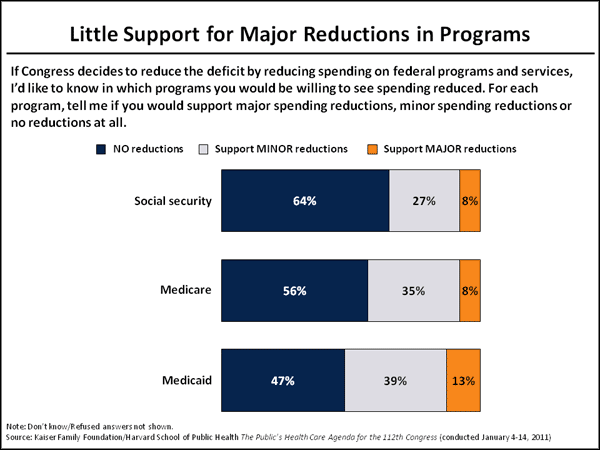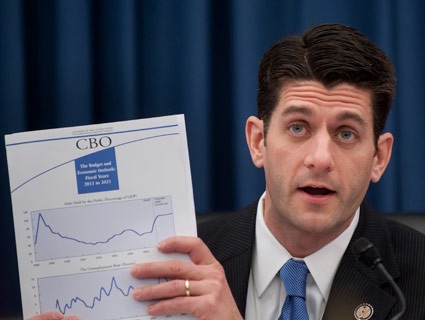
Via the Kaiser Family Foundation/kff.org
With much hoopla and fawning press coverage, Rep. Paul Ryan (R-Wisc.) is rolling out his 2012 budget plan on Tuesday. Though his budget’s reach is massive, promising $4 trillion in cuts, critics have seized on Ryan’s proposal to turn Medicare into a voucher system.
As I reported in February, Republicans have been preparing for months to gut Medicaid by proposing a “block-grant” system that would radically transform the program and allow states to make major cuts in benefits and eligibility. The prevailing assumption inside Washington is that Ryan’s proposal to privatize Medicare is far more politically combustible than his attempt to cut health care for the poor. And Democrats are already trying to make hay of his attack on seniors.
But new polling from the non-partisan Kaiser Family Foundation also suggests that Medicaid is more popular than Beltway insiders might assume. Though public support for Medicaid lags slightly behind support for Social Security and Medicare, it’s still robust: According to the KFF poll, only 13 percent of the public was willing to support major cuts to Medicaid, as compared to 8 percent on Social Security. According to Drew Altman, KFF’s CEO and president:
Sixty-four percent supported “no reductions” at all in Social Security as a way to reduce the deficit, 56% in Medicare, and 47% in Medicaid, hardly the mark of an unpopular program. Forty-six percent of independents and a little more than a third (35%) of Republicans said they would “not support any reductions at all” in Medicaid to reduce the deficit…
Fifty-nine percent of the American people said Medicaid was either “very important” to them or their families (39%) or “somewhat important” (20%).
Altman explains that part of the support for Medicaid comes from the services it provides for the elderly and disabled: though the program’s usually described as an entitlement for the poor, seniors and the disabled make up two-thirds of Medicaid costs. But there are other reasons that Medicaid has such robust public support. Due to the economic recession, more families are on Medicaid than ever, with 69.5 million Americans now on the rolls. Altman writes:
[Medicaid] has become more ingrained in the fabric of American life than has been generally realized…Medicaid now covers nearly one in three children, with the recession driving many previously middle-income children onto the program, providing coverage their parents no doubt value.
So neither Democrats nor Republicans should assume that Americans simply will look the other way if there are deep cuts to Medicaid. With more Americans benefitting from the program than ever—and still hurting from the impact of the recession—there could be a bigger backlash than anyone expects.







